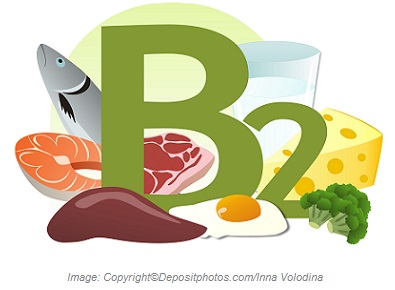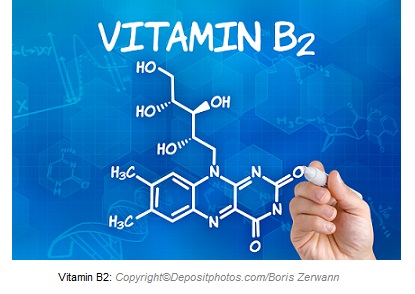 of carbohydrates, fat and protein, and in the production of energy (ATP).
of carbohydrates, fat and protein, and in the production of energy (ATP).
Functions of Vitamin B2:
- It has a key role in metabolizing carbohydrates, fat and protein.
- It helps with homocysteine metabolism, reducing risk of heart disease.
- It plays a role in metabolizing drugs and steroids.
- It aids the liver to detoxify toxins.
- By being a part of FAD (flavin adenine dinucleotide) and FMN (flavin mononuclesotide), it acts as a coenzyme in the production of energy.
- It is required for the activation of vitamins B6 and B9.
- It assists with recycling of glutathione, a natural antioxidant produced by the liver.
Food Sources and Absorption:
The best food source of vitamin B2 is brewer`s yeast. Other foods rich in vitamin B2 are dairy products, lean meat, fish, eggs, legumes, and green leafy vegetables (asparagus, broccoli, spinach and collard greens). A small amount of vitamin B2 is produced by the intestinal bacteria (probiotics) in the body.
Dietary vitamin B2 is absorbed well from the small intestine. Even though there is a small amount of vitamin B2 in the liver and kidneys, vitamin B2 is not usually stored in the body. Excess amount of vitamin B2 is eliminated in the urine, giving a yellowish green discoloration to the urine.
Vitamin B2 is extremely sensitive to light (especially ultraviolet light). This is why milk should be protected from exposing to sunlight. It is stable to heat and is not lost much by cooking.
Athletic Benefits of Vitamin B2:
- May improve endurance.

- Helps delay fatigue and exhaustion.
- May help with jet lag.
Non – Athletic Benefits of Vitamin B2:
The following conditions may benefit from vitamin B2:
- Chronic fatigue syndrome.
- Migraine headache.
- Cataracts.
- Keratoconus.
- Burning eyes and excessive tearing.
- Eye strain syndrome.
- Canker sores.
- Neonatal jaundice.
- Parkinson`s disease.
- Preeclampsia.
- Sickle cell anemia.
- Acne.
- Alcoholism.
- Eczema.
- Liver detoxification.
- Weight management.
Deficiency of Vitamin B2:
Signs and symptoms of vitamin B2 deficiency appear when daily dietary intake drops to below 0.6 mg. They include inflammation and redness of the tongue (magenta tongue), inflammation of the corners of the mouth (angular stomatitis), cracks at the corners of the mouth (cheilosis), seborrhea, eye fatigue, burning and dry eyes, and decreased energy level.
Dosage and Side Effects:
The RDA for vitamin B2 for adults is 1.2 mg. Though this vitamin is a part of any  B – Complex products and many multivitamins, it is available as tablets as well. The usual daily doses of vitamin B2 vary depending on the conditions for which it is used. For example, for preventing migraine, it is used 400 mg daily. The performance daily intakes (PDIs) for athletes and physically active adults are 30 – 300 mg.
B – Complex products and many multivitamins, it is available as tablets as well. The usual daily doses of vitamin B2 vary depending on the conditions for which it is used. For example, for preventing migraine, it is used 400 mg daily. The performance daily intakes (PDIs) for athletes and physically active adults are 30 – 300 mg.
Higher doses of vitamin B2 are needed in the following conditions:
- Athletes and exercisers.
- Women who take birth control pills.
- Women who are under hormonal replacement therapy (HRT).
- Stress.
Vitamin B2 does not cause any serious side effects. However, very high doses may cause itching, numbness, burning or prickling sensations, yellow or orange colored urine, and sensitivity to light.
Interactions:
The following medications may lower blood levels of vitamin B2:
- Tricyclic antidepressant medications (such as amitriptyline and doxepin).
- Antipsychotic medications (such as chlorpromazine or thorazine).
- Sulfonamides.
- Probenecid.
- Methotrexate.
- Phenytoin.
- Thiazide diuretics.

